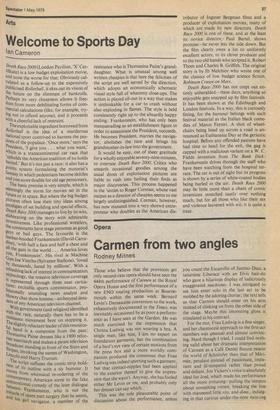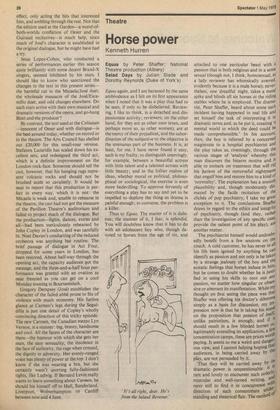Opera
Carmen from two angles
Rodney Milnes
Those who believe that the provinces get only second-rate opera should have seen the 444th performance of Carmen at the Royal Opera House and the first performance of a new ENO touring production at Bournemouth within the same week. Bernard Levin's Damascene conversion to the work, exhaustively documented in the Times, was inevitably occasioned by as poor a performance as I have seen at the Garden. He was much exercised by the impression that Christa Ludwig was not wearing a bra. A single man, like him, I am no expert on foundation garments, but the combination of a bird's eye view of certain motions from the press box and a more worldly companion produced the consensus that Frau Ludwig was indeed sporting such a garment, but that contact-nipples had been applied to the exterior thereof to give the impression that she wasn't. Anyway, she has fooled either Mr Levin or me, and probably only her dresser can say which.
This was the sole pleasurable point of discussion about the performance, unless
you count the Escamillo of Justino Diaz, a saturnine Liberace with an Elvis hair-do who gave a hilarious display of ludicrously exaggerated machismo. I was intrigued to see him enter solo in the last act to be mobbed by the adoring chorus; the text tells us that Carmen should enter on his arm instead of slinking on from the other side of the stage. Maybe this interesting gloss is stipulated in hicontIact.
For the rest, Frau Ludwig is a fine singer, and her chantoozie approach to the first-act numbers was unusual and almost convincing. Hard though [tried, I could find nothing valid about her dramatic interpretation of Carmen as a Café Demel floozie nearer the world of Schnitzier than that of Menamee, petulant instead of passionate, impatient and ill-tempered rather than proud and defiant. Jon Vickers's voice is absolutely ideal for Jose, which made his performance all the more irritating: pulling the tempos about something rotten, breaking the line with mannered little rits. and dims., indulging in that curious under-the-note moo-ing
effect, only acting the bits that interested him, and ambling through the rest. Not that the edition used at the Garden—a worsf-of both-worlds conflation of Oeser and the Guiraud recitatives—is much help, since much of Jose's character is established in the original dialogue, but he might have had a try.
Jesus Lopez-Cobos, who conducted a series of performances earlier this season quite brilliantly with some decent Brand-X singers, seemed inhibited by his stars. I should like to know who sanctioned the
changes to the text in this present series—
the harmful cut in the Micaela/Jose duet, the wholesale massacre of the Jose/Esca millo duet, and odd changes elsewhere. Do such stars arrive with their own musical and dramatic versions of the opera, and go-hang Bizet and the producer?
By contrast, the text used at the Coliseum —innocent of Oeser and with dialogue—is the best around today, whether on record or in the theatre. The Arts Council has shelled out £20,000 for this small-tour version. Stefanos Lazaridis has scaled down his excellent sets, and redesigned the third act, which is a definite improvement on the London rock-face. Someone should tell the cast, however, that his hanging rags represent volcanic rocks and should not be brushed aside so cavalierly. It would be neat to report that this production is perfect in every way, which it is not: the Micaela is weak and, unable to rehearse in the theatre, the cast had not got the measure of the Pavilion Theatre's auditorium and failed to project much of the dialogue. But the production—fights, dances, extras and all—had been meticulously rehearsed by John Copley in London, and was carefully lit. Noel Davies's conducting of the reduced orchestra was anything but routine. The brief passage of dialogue in Act Four, dropped for some years in London, has been restored. About half-way through the opening act, the capacity audience got the message, and the three-and-a-half hour performance was greeted with an ovation as near frenzied as you can get on a cool Monday evening in Bournemouth.
Gregory Dempsey (Jose) establishes the character of the failed abbe prone to fits of violence with much economy. His furtive glance at Carmen's legs during the Seguidilla is just one detail of Copley's wholly convincing direction of this tricky episode. The new Carmen, the Canadian mezzo Lyn Vernon, is a stunner: big, brassy, handsome and cool. All the facets of the character are there—the humour with which she gets her man, the easy sensuality, the insolence in the face of authority, the rage when crossed, the dignity in adversity. Her evenly-ranged voice has plenty of power at the top. I don't know if she was wearing a bra, but she certainly wasn't sporting fully-fashioned tights, like Ludwig. If Bernard Levin really wants to learn something about Carmen, he should hie himself off to Hull, Sunderland, Liverpool, Wolverhampton or Cardiff between now and 4 June.



































 Previous page
Previous page